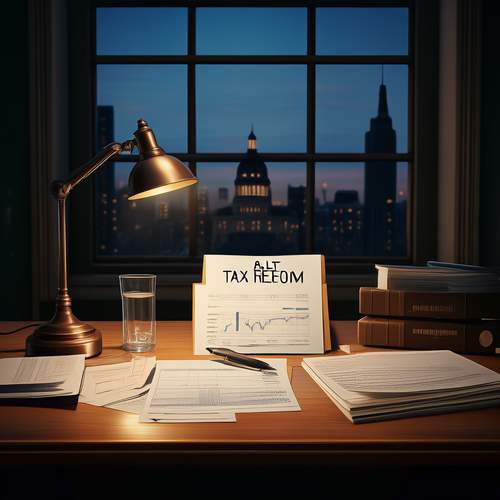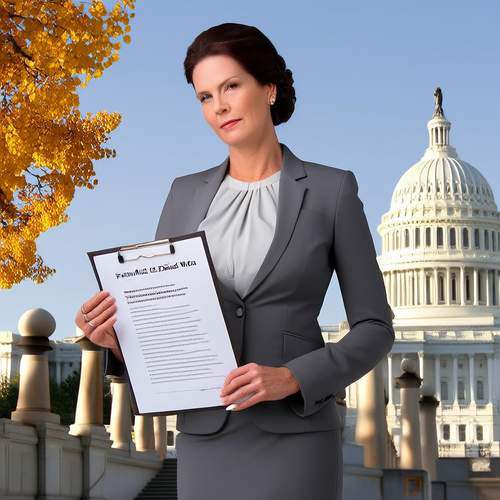In a world where the rich seem to get richer by the day, a new report from Oxfam has sent shockwaves through the conversation on wealth inequality. Despite a brief scare in the markets, the wealthiest 10 Americans have seen their fortunes balloon by a staggering $365 billion over the past year. To put that into perspective, that's roughly $1 billion per day for these billionaires. Meanwhile, the typical American worker made just over $50,000 in 2023. It would take 10 US workers at median earnings a mind-boggling 726,000 years to make that much money. This stark contrast underscores the growing wealth gap in the United States.
Oxfam's findings come at a critical time, as Republicans debate a costly bill that nonpartisan experts say will further enrich the wealthy and cut nearly $1 trillion from key safety net programs. "Billionaire wealth has increased astronomically while so many ordinary people struggle to make ends meet," said Rebecca Riddell, senior policy lead for economic and racial justice at Oxfam America. The report highlights the vast disparity between the ultra-rich and the rest of the country.
To measure the gains of the richest, Oxfam looked at the estimated wealth shifts of the top 10 on the Forbes Real-Time Billionaire List between the end of April 2024 and the end of April 2025. Elon Musk, the world's richest person and CEO of Tesla, accounts for just over half of the total wealth gains, with his net worth spiking by $186.1 billion over that span. Musk, who has been a pivotal figure in President Donald Trump's return to the White House, is on track to become the world's first trillionaire, according to an analysis last fall.
Other billionaires also saw significant gains. Meta boss Mark Zuckerberg and Walmart heir Rob Walton each increased their net worth by $38.7 billion. Legendary investor Warren Buffett gained $34.8 billion, while Walmart heir Jim Walton gained $36.5 billion. However, some billionaires, such as Google co-founders Larry Page and Sergey Brin, lost wealth over that period.
Oxfam argues that the Republican bill, a legislative priority of Trump, would further stack the deck against ordinary people in favor of the most affluent. "We’re seeing a tax code being designed that would bring about the world’s first trillionaire," Riddell said. Some progressives have called for fighting inequality by imposing a wealth tax on ultra-millionaires and billionaires. Oxfam found that a 3% tax on wealth above $1 billion would raise $50 billion from the 10 richest Americans alone—enough to provide food assistance for one year to 22.5 million people.
However, taxing wealth is not without its challenges. Valuing net worth can be complex, and some legal scholars have questioned whether a wealth tax is even constitutional. Lawmakers are currently debating whether and how to extend the 2017 Tax Cuts and Jobs Act, Trump's signature tax law. The bill that has advanced in the House would make permanent essentially all of the individual income tax breaks from the 2017 law and temporarily cut taxes on tips and overtime.
The legislation, known as the "One Big Beautiful Bill Act," would increase resources to US households, on average, according to a new analysis from the nonpartisan Congressional Budget Office (CBO). However, these gains would not be distributed evenly. Household resources would drop by 4% in 2033 for the bottom 10% of earners, the CBO found. By contrast, the top 10% of earners would gain 2% over that span due to lower taxes.
The Penn Wharton Budget Model analyzed the legislation and found that it would increase the nation’s economic output, measured by gross domestic product (GDP), by 0.5% in 10 years and 1.7% in 30 years. These economic gains would be fueled by higher savings and labor supply, incentivized by a weaker social safety net. However, the bill’s gains would go disproportionately to the rich. The top 10% of earners would receive about two-thirds (65%) of the total value of the legislation, while households in the bottom 20% would lose about $1,035 in 2026 due to cuts to Medicaid, food stamps, and other changes.
Kent Smetters, professor of business economics and public policy at the University of Pennsylvania’s Wharton School, noted that the top 10% of households would get about $3.1 trillion worth of tax cuts over 10 years. Smetters, who runs the Penn Wharton Budget Model, pointed out that the US tax system is "very progressive," with the same group paying about 70% of all federal income and payroll taxes.
Democratic Senator Elizabeth Warren of Massachusetts called the GOP bill a "giveaway" for the rich. "Donald Trump and Republicans in Congress are trying to jam through massive tax giveaways for the wealthiest Americans—millionaires and billionaires who are only getting richer by the day. Billionaires don’t need another break; working people do," Warren said in a statement.
The White House, however, argues that Trump’s budget priorities would help Americans thrive, extending gains from his first term in office. "Wealth inequality in the United States actually decreased for the first time in decades during President Trump’s first term thanks to his economic agenda of tax cuts, deregulation, domestic energy production, and tariffs," said White House spokesman Kush Desai. "The One, Big, Beautiful Bill locks many of these successful policies in, including President Trump’s historic first term tax cuts, to again restore prosperity for Main Street."
The debate comes as concerns increase over America’s $36 trillion mountain of debt. Moody’s Ratings downgraded the perfect credit rating it held for the United States since 1917 due to concerns about the surge in government debt over the past decade and high interest payment ratios. The White House has argued that the GOP tax bill will help address these concerns by cutting spending.
However, the Committee for a Responsible Federal Budget, a fiscal watchdog group, warns that the GOP bill would "add massively to near-term deficits" by piling another $3.3 trillion on the national debt over a decade, including interest. That figure surges to $5.2 trillion if temporary provisions are made permanent. The CBO found that the legislation would add an even bigger $3.8 trillion to the national debt. "This additional near-term borrowing could stoke inflation and push up interest rates," the Committee for a Responsible Federal Budget wrote in its analysis.
As lawmakers continue to debate the future of tax policy and the nation's budget, the stakes are high. The wealth gap is widening, and the decisions made today will shape the economic landscape for years to come. Ordinary Americans are watching closely, hoping that policies will be enacted that benefit the many, not just the few. The path forward is uncertain, but one thing is clear: the conversation on wealth inequality and economic fairness is far from over.




















